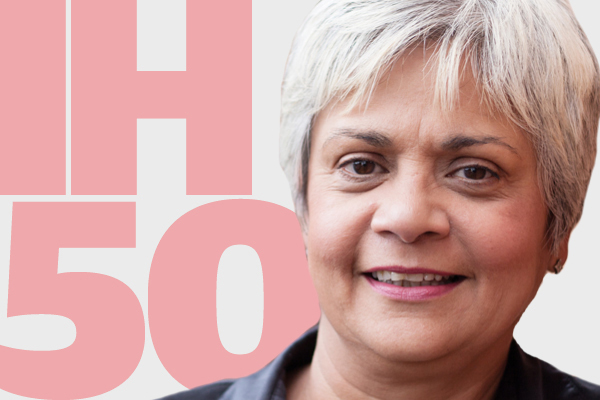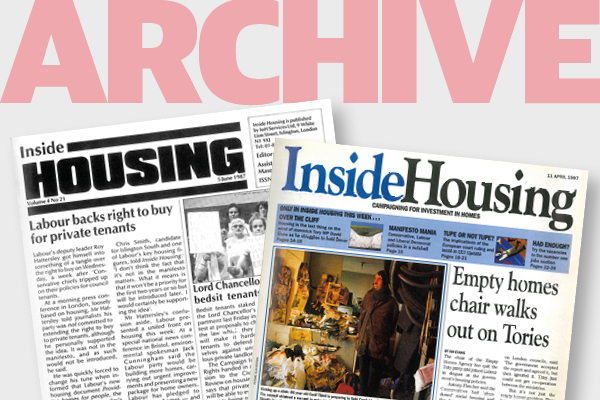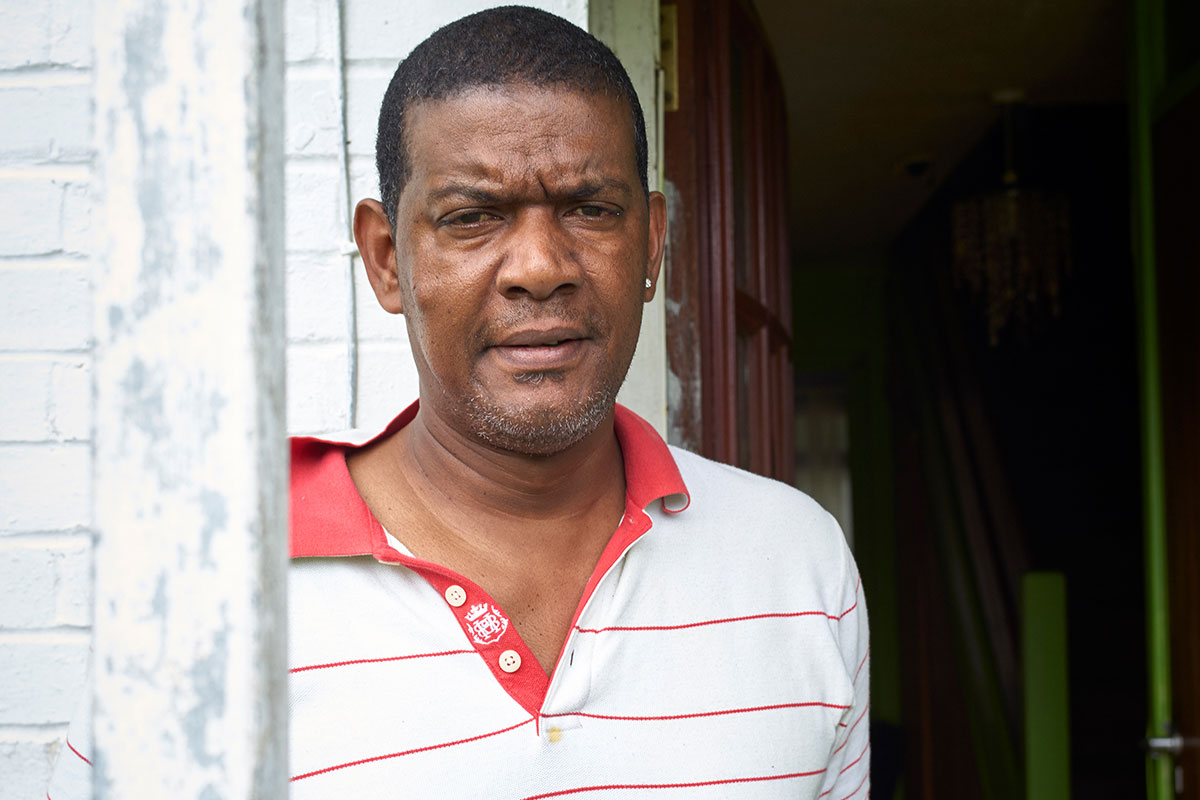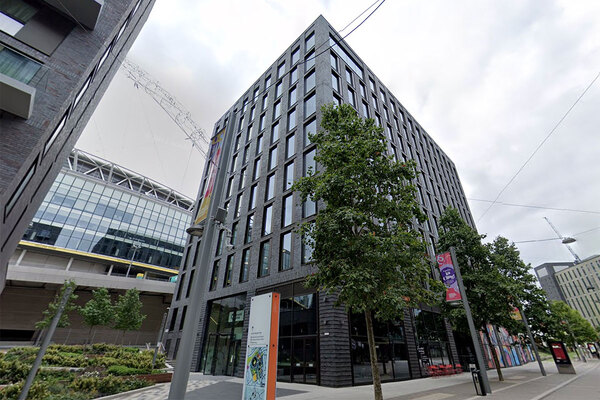Injustice upon injustice: the story of the Chagos Islanders
Around 50 years ago, residents of the Chagos Islands were forcibly displaced from their homes. Now, after moving to the UK in search of a better life, they have become victims of a different kind of hardship: the housing crisis. Pete Apps finds out more. Photography by Julian Anderson
Crawley, West Sussex
Visitors to Shirley Nairainen’s home can only enter one by one. Belongings stored on the upper bunk bed mean the door doesn’t open properly, so everyone has to squeeze in and close it again before the next person can come in.
Space is at a premium for her family. The four of them have lived in what most British families would consider a modestly sized living room for seven years. Her children, two boys aged 14 and 18, sleep on bunk beds. Shirley shares a double bed in the middle of the room with her husband Jean.
The room is full of evidence of a family living on top of each other. The walls are adorned with a mish-mash of pictures: Marvel superheroes, Bob Marley, wedding photos and older relatives. Cosmetics are lined up along the window ledge and clothes hang from every available hook. Food and cooking equipment sit in a small cupboard by the bed. It is difficult, Shirley says, for the boys to do their school and college work. It is difficult for them to invite friends over.
“Things were hard for us before,” says Shirley. “We came here because we thought it would be better. We didn’t expect it to be like this.”
Historic struggles
The room which the family calls home is the former living room of an ex-council house – almost certainly sold under the Right to Buy. They share the house with a family upstairs and are only allowed to use the communal kitchen before 6pm. Two years ago, the landlord increased the rent from £350 to £450 a month with two weeks’ notice. Jean, a cleaner at Gatwick Airport, took extra shifts to keep the family off the streets.
These conditions are among the worst inflicted by what we now call the housing crisis in Britain. But for the Nairainen family, the problems go back further.
Theirs is a story which starts on a remote island in the Indian Ocean in the 1960s, covers one of the darkest episodes of Britain’s modern history and ends in Crawley, a small market town in Sussex where hundreds of vulnerable families are struggling to cope at the sharpest edge of a failing housing market.
The Nairainens are part of a community of around 3,000 Chagos Islanders living in Crawley. Until 1968, the community lived on an archipelago of small islands in the middle of the Indian Ocean, which Britain had claimed as part of its empire in 1786.
“We came here because we thought it would be better. We didn’t expect it to be like this.”
They lived in a setting of idyllic white sand beaches and green vegetation. While life was not prosperous, the sea was good for fishing, the land was fertile and there was work on coconut plantations. The community, mostly settlers from India and Africa, had built a society which included villages, hospitals, roads, churches and schools.
But one island in particular – Diego Garcia – had caught the attention of the US, which sought a strategic military base in the region. In a secret agreement in 1966, the US paid Britain $14m to sell the islands and evict the inhabitants, who numbered around 1,500.
This was done brutally. A whole community was forced onto ships. Their homes and lands were burned. Pet dogs were gassed. They were transported to Mauritius and the Seychelles, dumped in the ports and left.
Over the coming decades, Diego Garcia was turned into a huge military base. It was used for long-range bombing runs in the Middle East, and in the 2000s terror suspects were flown there in secret to be tortured.
Meanwhile, the Chagossians lived in poverty in corrugated iron slums in Mauritius, where they struggled to find work and acceptance. But in 2002 things changed. An alteration to the law in Britain enabled anyone born between 1969 and 1983 to claim British citizenship and a British passport. Some were able to save money for a flight to Britain and began landing at Gatwick in search of a better life.
But there wasn’t much of a life waiting for them. At first, many slept in the airport before they were cleared out and placed in temporary accommodation in nearby Crawley. Over the years, more have joined them to form a small community (but a reasonably substantial one, in the context of a town of around 100,000).
Since then, the community has faced a number of pressures. The peculiar rules on qualification for a passport splits families, with parents, children, husbands and wives separated by the 1983 cut-off date. Proper employment has been difficult to find. There has been a backlash of racism locally and the community is plagued by mental health problems.
But the number one issue, according to community representatives, is housing.
Undoubtedly, the arrival of so many people has put pressure on the local housing market. There are 1,324 households on the council’s waiting list, compared to 520 in nearby Horsham and 691 in Adur. And this means a long wait.
Shirley’s family has been waiting for seven years. She shows Inside Housing a two-month-old letter from the council showing that the family has been moved down from Category C to D on the council’s list – pushing them further from their dream of a reasonably sized home. She claims housing officers have at times been hostile.
“They have said things like: ‘Why can’t you go back to where you came from?’,” she says. “Which is so unfair – we want to, but we can’t.”
Chagossians have fought hard for the right to return to their homeland but so far have been thwarted. In 2016, the Supreme Court upheld a decision blocking their bid to return by a slim majority. Currently, hopes are pinned on Mauritius’ plan to contest Britain’s claimed sovereignty of the archipelago in international courts, and a further judicial review is planned in the UK.
Precarious position
Crawley Council declines an interview on the question of housing the community, and instead provides a blunt statement. “Many of the [Chagossian] community that we assess are… deemed not to be homeless,” a spokesperson says. “They still have accommodation available to them, do not fall under a high priority as they have arrived as single people with no dependent children residing with them in the UK, or are intentionally homeless as they have voluntarily left their home accommodation to come to the UK, without securing further accommodation prior to their arrival.”
But this leaves them destitute. The only option is the private rented sector. With their financial position understandably precarious, the families cannot afford the month’s rent in advance, deposit, and letting agency fees which private landlords demand. And so many, like the Nairainens, find themselves stuck in one room.
Things also become difficult for those who need specialist housing. Edmee is 88. She is one of the survivors of the original eviction, having been forced from the island as a young woman by British soldiers.
“Many of the [Chagossian] community… are deemed not to be homeless. They still have accommodation available to them.”
Now she is bed-bound following a multitude of health conditions including breast cancer, dementia, diabetes and heart failure. She manages a weak “bonjour” and “merci beaucoup” when she sees Inside Housing entering her room. Her niece, Maeta, is her full-time carer.
Their home lacks a stair lift and the necessary adaptations, meaning Maeta has to carry her aunt up and down the stairs and in and out of the bath. There is no wheelchair ramp leading to their house.
“It makes me so angry,” says Maeta. “I just want somewhere nice for her to end her life. This,” she gestures around the bedroom, “is just not fair.”
Asked about what happened to her aunt when she was forced from her home in 1968, Maeta shakes her head. “It is a story I’ve heard many times, but I can’t tell it. I get too upset.”
The family pays £945 a month to rent the two-up, two-down former council property. Maeta says the varying immigration statuses of those in the home – some are waiting for their citizenship to be approved – mean social services will not pay for adaptations.
For those unable to access private rented accommodation at all, the answer is a seemingly endless stint in temporary hotel rooms. Maryvonne (pictured above), 61, and her daughter have moved around hotels in Crawley since they arrived 10 years ago, twice finding a private rented home and twice being evicted.
“I have had bad luck,” she explains through a translator – a younger Chagossian woman. Despite this she is chipper, laughing and joking. But her mood changes when she talks about her daughter, who is 17. She was six when they arrived from Mauritius in 2007 and has spent most of her life in hotel rooms. She still shares a double bed with her mother. On her side of the bed is a pink ring-bound notebook and a toy rabbit.
“I am patient, I still think I will get a house eventually from the council,” says Maryvonne. “But it is worse for my daughter. This is no way for her to live. She can’t have friends around; we cannot receive family here.”
Maryvonne has made the room home as best she can. She has her own pots and pans stored in the hotel wardrobe, and food in the mini-fridge. She grows lemongrass, which she says helps her persistent chest problems, in an empty jam jar on the windowsill.
“I knew nothing about the council, about council houses or the help we could get. No one helped us.”
But it is clear she is lost in the bureaucracy of the housing system. She no longer knows who is paying her hotel bills. She had a support worker from the council but says she hasn’t seen them for months. She doesn’t know how her application for permanent housing is going, or if it is even still active. Her husband died a few months ago.
Isabelle Charlot, one of three Chagossians from the representative group Chagos Islanders Movement, who have shown Inside Housing around Crawley, tells her own story as we prepare to leave. She arrived here 13 years ago, pregnant with her third son, and lived in a single room with her brother and her young family.
“I knew nothing about the council, about council houses or the help we could get,” she says. “No one helped us. Life was hard in Mauritius. We were the lowest caste there and it was slum living, proper ghetto life. We came here for a better life.”
She asks Inside Housing: “What do you think, then?” It is hard to answer. Injustice has followed injustice for the people of the Chagos Islands. And while legal battles rumble on to deliver what they ultimately want – the right to return to their homeland – their immediate lives could be greatly improved by the provision of proper housing.
While Crawley Council is not wholly to blame for the monstrous failures in Britain’s housing market which create these circumstances – chiefly a lack of social housing and an unregulated private rented sector – it is hard to escape the feeling that we as a country should be doing more to make amends.
Britain’s actions in regards to the Chagos Islands are a stain on our past. But the ongoing failure to properly house the victims of that crime in this small corner of Sussex represent a stain on our present.
The history of the Chagos Islands
1800s Settlers from Africa and India populate the islands in the Indian Ocean
1966 The UK government secretly sells Diego Garcia island to the United States for use as a military base
1968-1973 Around 1,500 Chagossians are evicted by Britain and dumped in Mauritius and the Seychelles
1997 A legal battle is launched in the UK courts calling for a right to return for Chagossian refugees
2002 Chagossians born between 1969 and 1983 are given British citizenship and begin to arrive in the UK
2008 The legal challenge is rejected by Britain’s most senior court. This decision is upheld by the Supreme Court in 2016












